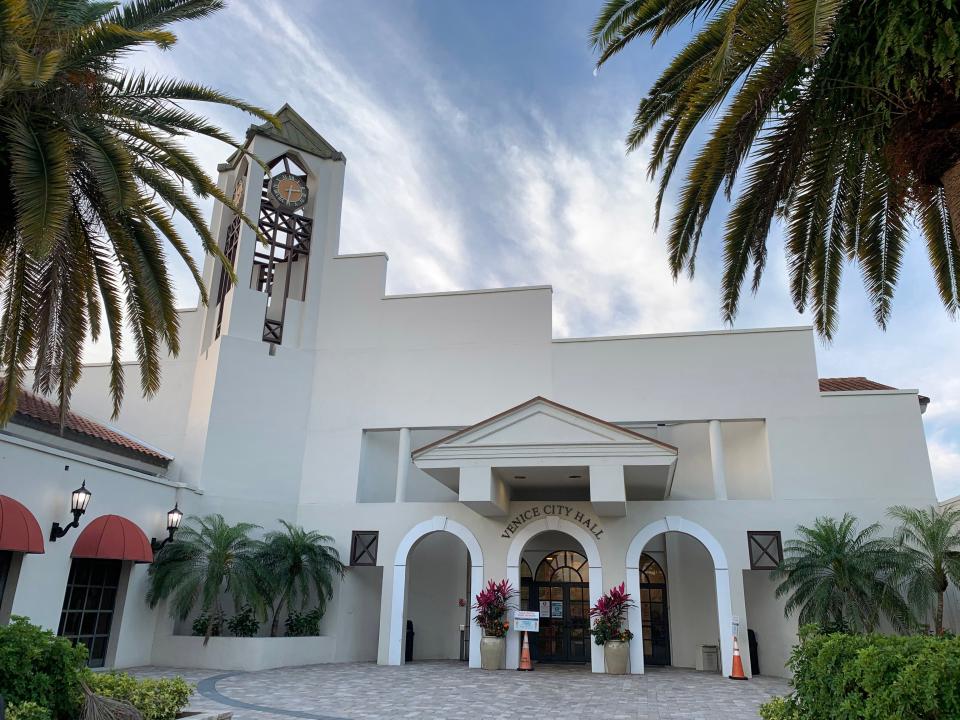Venice voters can decide on council pay and powers of the mayor in 15 charter amendments
VENICE – In addition to picking a new mayor and one new council member on Nov. 8, city of Venice voters will decide on 15 separate changes to the city charter.
Several pertain to the council itself – such as whether the board members should receive a raise and whether to impose attendance policies and term limits.
Others apply to the process of government, such as the broadening of the city manager's powers, development of the city budget, the selection of advisory board members and even how to fill a mid-term City Council vacancy.
Venice council race: Sarasota Republican Party targets Democrat in Venice council race with three mailers
Rachel Frank: Frank sworn in as new Seat 2 member on Venice City Council
Voters should consult their ballot for the exact order and language for each of the 15 amendments, starting with the longstanding issue of council compensation.
How much should the council get paid?
Since 2004, the typical council member has received a salary of $850 per month, or $10,200 per year. The mayor makes $1,000 a month, or $12,000 a year.
In 2011, as part of a cost-cutting measure during the Great Recession, council members lost access to city subsidized health insurance.
“We wanted to keep as many jobs as possible,” recalled former Mayor John Holic, who was a member of this year’s charter review board. “We figured every $30,000 we saved in expenses was a potential for keeping a person employed.
“This time around I think some of the council members have definitely earned an increase of salaries,” he added. “The rationale behind it was we had to get the salaries up to a point where younger people could take the job without hurting too badly.
“Even at the $20,000 dollar mark, that’s not going to be enough to live on.”

A yes vote on what's technically question 6 on the ballot would amend the chanter so that a council member’s salary would be 20% of the salary of a member of the Sarasota County Commission as determined by the state Legislature. For the 2022-23 fiscal year, the County Commission salary is $99,508 a year, which means that the typical council salary would be $19,901.60. The mayor would receive another $1,200 annually.
How, where and how many years should council members work?
The fifth ballot question deals with council member term limits, the seventh with meeting attendance requirements, the eighth a standard of conduct, while the ninth and 10th deal with filling vacancies.
Currently an individual is limited to three consecutive three-year terms as a council member and three consecutive terms as mayor. In theory, a council member could follow up nine years there with nine years as mayor.
A yes vote on question 5 would mean that any individual who completes nine consecutive years on the council would have to sit out a year before running again.
A yes vote on question 7 means a council member would lose their seat on the council if they had three unexcused absences in any one calendar year.
This tightens up a provision where a council member would lose their seat if they had unexcused absences in any three consecutive meetings in a calendar year.
A yes vote on question 8 would loosen the penalty for violation of the Florida Code of Ethics or standards of conduct and make such a violation only grounds for removal from office.
Now, such a violation would mandate the removal of that member.
Questions 9, 10 and 14 deal with filling a vacancy – such as when Brian Kelly resigned from Seat 2 and Joe Neunder resigned from Seat 6.

A yes vote on question 10 would give the City Council 60 days by choosing from several applicants – the person who receives the most votes wins and a tie decided by drawing lots. That would eliminate the need for a special election. Currently the charter requires the council to fill a vacancy within 30 days or hold a special election within 60 days.
A yes vote on question 9 would allow that appointed council member to fill the entire unexpired term. Under the current charter the appointed member serves until the next election and a candidate would run to fill out the remainder of the term.
That’s what happened with Kelly’s seat. Rachel Frank was appointed to fill the remainder of the current term in Seat 2 and Dick Longo filed to run for Seat 2 on this year’s ballot – he was awarded the seat when no other candidate filed.
A yes vote on question 14 would amend the provision that allowed Longo to be awarded the seat to include a provision on when no qualified candidates apply for a seat.
Under that scenario, if a council member was not seeking an additional term and nobody applied to fill that seat, the current occupant would remain in place for another year.
A yes vote on question 4 would postpone election of a vice mayor until after the certification of election results, so new board members can participate. Now, that position is chosen at the first meeting after the regular election, which may come before the new council members are certified.
Powers of the mayor
A yes vote on question 1 would require the City Council to make appointments to advisory boards, the most active of which is the Planning Commission.
This amendment codifies a practice that started with the term of Mayor Ron Feinsod, though arguably Holic started things off when he preemptively appointed Barry Snyder and Shaun Graser before leaving office.
Council members – who can only communicate during open meetings – rank individual applicants and in some cases the applicant with the highest rank wins.
Until Feinsod, the mayor appointed board members with the advice and consent of the rest of the council.
Question 2 deals with a situation that resulted from the COVID-19 pandemic and the standardization of hybrid meetings, where one or more council members can attend via Zoom.
A yes vote on question 2 would require that the person presiding over the meeting must physically be in council chambers for the meeting when a physical quorum must be present.
This would mostly come into play when the mayor is attending virtually, with the vice mayor – or another ranking council member – chairing the meeting.
Related: Permit approved for downtown Venice craft festival
A yes vote on question 3 would amend the charter to allow the City Council to delegate duties such as execution of contracts and other documents and signing checks. Until COVID-19 that duty fell to the mayor.
Feinsod was reluctant to sign a special event permit on Aug. 23, 2021 for Venice MainStreet’s Labor Day craft festival because he could not institute a mask mandate in the face of then-rising COVID-19 numbers.
“The mayor does not have veto power and that was a method of doing a pocket veto – refusing to sign – so we had to get rid of that,” Holic said.
City Manager Ed Lavallee reinstituted a ban on special events to cover that decision but by the end of the week the city cobbled together a case-by-case approval policy – that did not require masks – allowing the Labor Day festival to proceed.
Revisions, surety bonds and referendums
A yes vote on question 12 would remove a requirement to notice budget public hearings and defer to state law; remove a requirement that the council prescribe the ballot form, which is handled by the Supervisor of Elections; clarify that the council can issue bonds; and clarify whether the oath of office must be kept on file.
A yes vote on question 13 would remove an outdated requirement the council determine what positions need to be bonded.
Question 15 deals with petitions that institute a citizens referendum for a charter amendment. A yes vote on this amendment would require at all referendum petition signatures include the date that signature was rendered and clarifies that all signatures submitted with the petition must be dated within a six-month window prior to submission to the city clerk.
Earle Kimel primarily covers south Sarasota County for the Herald-Tribune and can be reached at earle.kimel@heraldtribune.com. Support local journalism with a digital subscription to the Herald-Tribune.
This article originally appeared on Sarasota Herald-Tribune: Election Day 2022: Venice votes can consider 15 charter amendments

